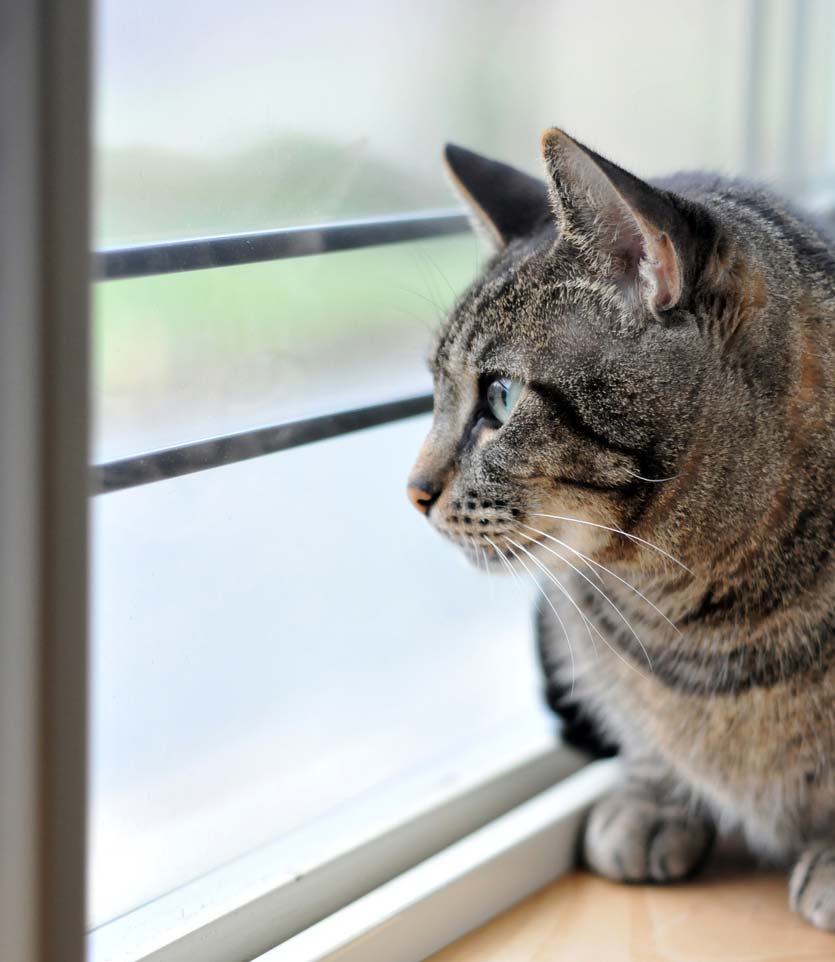How to Decide on an Indoor or Outdoor Lifestyle for Your Cat

You have just brought your new kitten home, and she is asking to go out. Have you thought about whether you will elect to keep your cat as an indoor cat, as a cat with a home base going outside, or a "cat about town" who may drop over to the porch for a treat now and then but lives on your farm or rural property as an outdoor kitty?
This is a big decision and should be considered carefully. A cat that asks to go out is not a cat that needs to go out! Millions of cats spend their lifespan in an apartment or busy urban area without ever going past the doorstop, and are safe, healthy, and comfortable.
It is wise to make a choice and stick with it. If you are inconsistent and let the cat out sometimes but not others, it is confusing to the cat and will tend to encourage her to hang around the doors, just in case you will let her out. A cat that does not go outside does not seem to know what she is missing, so don't feel that keeping her in is an inappropriate caregiver decision.
Common Reasons Cats Are Allowed Outside
Here are some of the common reasons people allow their cats outdoors:
- For hunting. Cats do not need to hunt to have a normal quality of life. Some outdoor cats do not hunt. We also need to think of the impact of millions of outdoor cats on the populations of wild birds and mammals. In many cases, bird species are endangered, especially songbirds, so if your cat goes out, put a breakaway collar and bell on her to give the birds a chance. Mind you, Tabby the perfect predator can eventually learn to crawl stealthily along so as not to activate the bell.
- To mate and reproduce.Cats do not need to have offspring to enjoy a full life. Some old wives tales might have you believe that it is somehow important for the female cat to have a litter. This is not true.
- For enrichment.It absolutely is important to make sure your indoor cat isn't bored or lazy. Providing scratching posts, interactive playtime, and opportunities to exercise the mind are all important for a happy, healthy kitty, but the outside provides more risks than benefits.
- Outdoor cats are at high risk for cat fighting injuries and, in some areas, attack by roaming dogs or coyotes. Sometimes the wound infections can be very serious. Serious wounds can cause permanent scarring or disfigurement or worse. Cat fights are also an excellent way to transmit feline immunodeficiency virus (FIV), and close social contact with strays serves to encourage transfer of feline leukemia virus (FeLV). Even with vaccines, protection against these viruses is not 100%. These slow viruses are not treatable, and infection will frequently lead to chronic diseases and eventual death.
- Spaying female cats and castrating males is essential if they are to be outdoors. Otherwise, unwanted litters of kittens will be born, leading to further overpopulation. Intact toms are more likely to fight, and intact queens may become exhausted due to uncontrolled reproduction, resulting in up to 3 litters per year.
- Parasites of all types live outdoors in soil, water, and feces repositories in gardens that community cats have chosen as toilets. Fleas, ticks, mites, roundworms, hookworms, giardia, toxoplasma, tapeworms, and many others lurk outdoors and can cause diarrhea, debilitation, or more serious effects. Many of these are also zoonotic (people and pets share them), so bringing home parasites also means risk for your friends and family members.
- Cats may be hit by cars outside; this is, unfortunately, an all-too-frequent sight at veterinary clinics. Obviously, this may lead to major injuries such as bone fractures, head, chest and organ injury, or even death.
- Cats may take falls from high places in spite of their famous balance and reflexes. They may fall from trees, apartment balconies (high-rise syndrome), or other perches. Cats are also famous for getting stuck up high in trees, as your local firefighter will tell you.
- Poisons of many types are also a risk for roaming cats. Unfortunately, if you are not there to witness the nature of the poison exposure, diagnosis at the hospital can be very challenging, leading to delays in treatment or perhaps best guess therapy based on signs if testing is inconclusive.
- Though it is hard to believe, we still have people in this century who dislike cats enough to hurt them. Roaming cats may fall victim to miscreants. Unfortunately, they do not understand humane treatment of cats and may subject the cat to harm.
- Outdoor cats may fall victim to freak weather or just plain old bad weather—cold snaps, ice storms, tornadoes, and other natural risks can lead to harm.
- Cats that are only let out periodically may not develop the "street smarts" needed to keep safe and are at higher risk for injury than the feral cat.
Cats that spend time outdoors live a much shorter lifespan than indoor cats. Typical indoor cats now live 14-16 years of age and some much longer—up to the late 20's, while outdoor cats unfortunately live, on average, about 5-8 years.
What Are the Risks for Cats Outside?
There are many risks for outdoor cats, including:
Recent research suggests that, as long as you provide lots of affection, attention, play time, exercise, scratching posts, and toys, that the indoor cat will be a contented cat. A cat that does not receive attention may be a lonely cat, and if you have a busy schedule, you might consider having a second cat to keep the other company at home. Cats are much more social creatures than we previously gave them credit for. But if we take just a little time out of our busy life every day to interact with them, the indoor lifestyle is the choice that leads to a longer, more worry-free lifespan.
Obviously, if you have a working farm and have a cat specifically for rodent control, the outdoor life is the only one that is workable. Farm cats are "fat cats" due to the plentiful supply of food on the move and shelter provided by barns and sheds. Talk to your veterinarian about the best vaccination, flea and tick preventative, and intestinal parasite prevention schedule for your barn cat.
Catios: A Safer Outdoor Alternative for Cats
A possible alternative if you want to allow your cat to experience the outdoors more safely is to construct some sort of catio for her. This is an enclosed space outside. Your cat can enjoy the smells, sounds, and fresh air of being outside without being able to roam around, get lost, or ingest something toxic.
A catio may be as simple as a large wire kennel with a litter box, cat bed, and water bowl inside, or as complicated as an extensive addition to your home, complete with catwalks and small tree trunks. It can be a place that your cat can enter from a window or door on her own or a separate space
that she can only get into if you take her. You can learn more about catios and the different options available in this article by the Humane Society of the United States: "The Cat's Meow."
You May Also Like These Articles:
How to Introduce a New Cat to a Household that Already Has a Cat
Declawing Cats: Banning Declaw Surgeries
Sisal Fabric: The Best Material for Cat Scratching Posts
Cat Not Using Litter Box? Inappropriate Urination in Cats
Feliway - A Useful Tool to Help Treat Stress in Cats
Pica in Cats: Why Cats Eat Strange Things
The Dangers of Strings, Ribbons, and Yarn for Cats
How Do I Get My Cat into a Carrier?
Notice: Ask-a-Vet is an affiliated service for those who wish to speak with a veterinary professional about their pet's specific condition. Initially, a bot will ask questions to determine the general nature of your concern. Then, you will be transferred to a human. There is a charge for the service if you choose to connect to a veterinarian. Ask-a-Vet is not manned by the staff or owners of CatHealth.com, and the advice given should not delay or replace a visit to your veterinarian.





